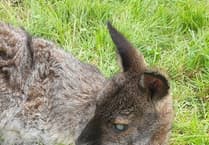This year is proving to be a good year for mushrooms and toadstools which have benefitted from a sunny spring and summer, followed by a wet autumn.
The Royal Horticultural Society has logged more than 768 species of fungi in its five gardens so far this year, up from 570 last year.
There are actually more than 4,000 species of fungi in the UK and the vast majority are not poisonous, but some definitely are and the most hazardous have suitably sinister names such as ‘destroying angel’, ‘funeral bell’ and ‘death cap’.
Play it safe and remove any mushrooms that may be growing in your garden, particularly if you have an inquisitive or greedy dog that will eat anything it comes across.
And when you’re out for a walk in wooded areas watch out for mushrooms growing in the darker, damper areas; and don’t let your dog explore them.
Vets advise that any ingestion of fungi should be treated as a potential emergency, and that a vet or poison helpline should be called immediately.
The animal poison line telephone number – 01202 509000 - is worth keeping to-hand or logged into your mobile phone. It could save your pet’s life.
As with any suspected poisoning, a sample of what may have been eaten should be safely gathered, perhaps using a poo bag, so that its toxicity can be evaluated by an expert.
If treatment (usually a stomach flush) is administered quickly, a dog may not develop symptoms of poisoning. These symptoms include excessive drooling, vomiting, diarrhoea and abdominal pain; tremors, seizures and poor co-ordination; weakness and lack of energy; jaundice; and ultimately coma, then death.
Not all autumnal dangers are natural, and some man-made ones are more obvious than others.
This is the time of year when people start to worry about rodents coming into their homes, and most pet owners will be only too aware of the poisonous properties of rodenticides.
If rodent control is absolutely necessary, then a safer method is to use humane traps that are placed out of the reach of pets and regularly checked.
And as the nights draw in, it’s tempting to light candles and burn scented oils to create a cosy atmosphere, but the resultant fumes can cause inflammation of a dog’s airways, or trigger asthma in a cat.
Whilst pets can be a source of anxiety, they more than make up for it by being fabulous companions.
Five-year-old brothers, Ralph and Steve, are the friendliest of dogs whose previous owner found them too demanding of her time as their sole owner.
They get on very well with each other (and will be rehomed together), and they can be left alone for a few hours at a time, but when the human in their life is at home they want constant attention. You could call them ‘super companionable’, and so they would enjoy living with more than one person – a family with older children would be ideal.
They are good dogs in most ways, but as Yorkshire terrier/poodle crosses they are genetically programmed to chase cats.
They also have ‘small dog syndrome’ in that they can react to other dogs, especially entire males, when they are out on walks, and they can be unsettled in busy settings like shops and cafes.
They tick all the boxes when it comes to travelling in a car, being groomed, going to the vets, and they have attended doggy day care. They have impeccable manners when being walked on a lead (other than when they react to a dog they feel threatened by), and they have excellent recall when off-lead.
Both Ralph and Steve enjoy good health and they have full vaccination and annual health check records, and they will undoubtedly give years of canine enjoyment to their lucky new owners.
-and-Ralph-(R).jpeg?width=455)



